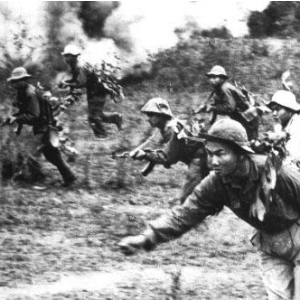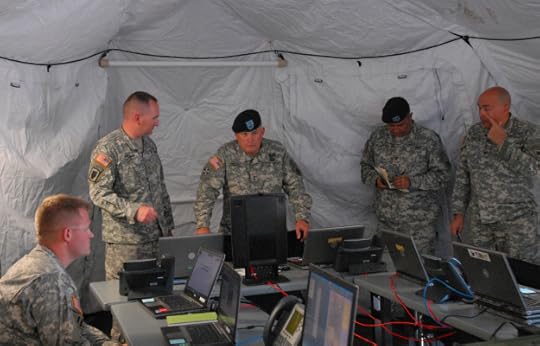Thomas E. Ricks's Blog, page 93
September 3, 2013
While we were out (I): News from all over

A drone the size of a fighter jet
made a landing on a carrier. Its processors then flew to Las Vegas
and began groping other processors that lacked prongs. No,
that last sentence is not true. But where is the refueling capacity? If the
Navy were serious, that would be the next step.
Two Coast Guard rescue swimmers
received Distinguished Flying Crosses for rescuing most of the crew of the Bounty when it went down in the Atlantic last year. I think that
is something great to be able to tell your grandchildren about -- "This is for
when I saved people aboard the Bounty ."
Sen. Rand Paul and Gov. Chris
Christie finally began the debate on what the Republican Party thinks
about national security. Long overdue and glad to see it. I am less glad
that the media has been covering it as some sort of celebrity personality
clash, rather than a serious difference in outlook. At any rate, it looks like
the NSA violates the law several times a day.
That Chinese general's son (a teenager
who surfaced in this blog two years ago for abusing people with his customized BMW) was charged in July with
participating in a gang rape. In other China news, the "African lion" on display in a private
zoo turned out to be a big dog.
The zoo got away with it until the animal started barking.
Brig. Gen. Jeffrey Sinclair, the most famous
one-star general in the U.S. military, pleaded not guilty to charges of sexual assault of a
female Army captain. The facts begin to hit the fan on Sept. 30. Meantime, you can read this.
Gen. Wes Clark dumped his wife of 46 years for a woman 16 years
younger than that, a fashion designer in New York City. He sued for divorce on
the grounds of "general indignities."
The CO of 22 MEU got relieved. Cause not disclosed. I dunno, maybe
he dumped his wife for a New York fashion designer.
So did the commander of a missile wing at Malmstrom AFB. Get fired, I mean. I
don't know if he is dating a fashion designer.
There was a messy court-martial of a female sailor charged with
fraternization after she married another female sailor. She beat the rap. I
confess I don't understand the long-range legal implications of this case. It
is a weird case because when the relationship began the two women held the same
rank, which makes one wonder if this case would have been brought against a
heterosexual couple.
Thomas E. Ricks of Dodge City was in
trouble. Again. He needs to blog to keep him busy and out of trouble.
Speaking of looking for trouble, Camp
Lejeune Marines caught a 14-foot-long tiger
shark by roping and drowning
it. "I've not seen nobody put
a shark like that to pier in my years as a fisherman," said the skipper of the charter boat they
were on. The shark had been dating a New York fashion designer.
Iraq's foreign minister said his
country is unable to stop Iran from flying arms to
Syria through Iraqi
airspace. "Like, dude, not our problem," was the vibe. But Iraq does have
problems: The death toll in July was the highest in five years. August not much better.
Speaking of Iraq, someone mortared Abu Ghraib prison. What year do they think this is, 2004?
On the bright side, Iraq declared
part of the re-watered marshes a national park. I didn't know there was a kind of
bird called "the Iraq Babbler." (Insert your joke here.)
Remember Afghanistan? Anyone?
Hooting Horton checked out as a
blogger. Here are the snows of yesteryear.
The governor of Maine, a nutjob named Paul LePage, was in an F-35 simulator and stated, "I want to find the [Portland] Press Herald building and blow it up." He said it was a joke.
If you heard a kid in a high school say something like that, would you laugh?
Oliver Stone,
a nutjob who makes films, revealed that there was no reason to drop the atomic
bomb in World War II, and also recommended that Japan make nice with China,
because China is so peaceful. If LePage gets elected president, maybe Stone can
be his secretary of state.
Speaking of left and right, I think Al Sharpton
and Bill O'Reilly deserve each other.
The Financial
Times very nicely took Emile Simpson, a contributor
to this blog, out to a lunch
of steak tartare, Dorset crab, and wine. I was gonna complain that I wanted one
of these cushy invites, but then I remembered that the FT did in fact take me to a nice Italian lunch in DC a coupla years
ago -- though not one where they wrote about every dish I ordered and how I ate
it.
Every day brings a new surprise. I didn't know
there were Jane Austen re-enactors. I think they should hook up with the Civil War re-enactors. Calling Tony Horwitz and Geraldine Brooks.
The BD award for best commentary on NSA snooping on Americans goes, of course, to Duffel Blog. Mais
bien sur. Second best is here.
August 29, 2013
A smart young JO: I am so outta here, but I know that saying so makes no difference

During the summer, the Best Defense is in
re-runs. Here are some favorites that ran in late 2012 and in 2013. This item originally
ran on April 25, 2013.
By "One Gone Cat
"
Best Defense guest columnist
I thought of offering to write an
essay for you that gave my own reasons or that made my own arguments for how
the officer corps can be improved to retain the best and the brightest, but
thinking about it just made me angry. It made me angry because I knew it would
not make any difference, just as the countless opinion pieces written by
disgruntled junior officers and NCOs or concerned senior officers and NCOs
won't make any difference. The military is too inflexible, the senior officers
are too comfortable with the status quo, human resources command believes too
strongly in whatever crazy algorithm they have determining entry assignments,
and the civilian leadership is too intimidated by a bunch of men who just lost
two wars to force a change.
Writing about my experience won't
make a difference because senior leaders will look at it and say that it's an
anomaly, or that I don't have the ability yet to see the big picture, or that I
cannot reflect and see how things actually work very well, or maybe that I got
the career I deserved based on my abilities. I understand that they cannot
understand me, because I don't understand them.
I don't understand how the
military can go on pretending that we didn't lose the war in Iraq or that we're
not about to lose the war in Afghanistan. Withdrawing with honor can still be
losing. Lee withdrew with honor at Gettysburg. He also lost. He lost because
the conditions on the battlefield as he withdrew were not in his favor, but
they were in the favor of his enemy. The same is true of Iraq today. They might
argue that the American people did not support the resources needed to win in
Iraq or that the politicians made errors that could not be overcome by military
genius. I do not know if that is true, but if it is true, we still lost -- we
just should not blame generals.
I don't understand how senior
officers can avoid feeling ashamed that we seem to have no idea how to have a
smaller budget without damaging training and readiness. I guess the Marines
really are the best branch of service. The rest of us were simply propped up
with ever-increasing budgets, and we wasted more of the taxpayers' money during
the wars than anyone will ever know (no one will ever audit the amount wasted
on things like the rent-a-captain program).
I don't understand how the
chief of staff of the Army can have a plan for decreasing troop levels that
relies almost entirely on natural attrition without any discussion of a plan to
ensure that our best stay and our worst are separated from service.
I don't understand how they can
waste so much money on education for officers through ROTC, and then show no
desire to use the skills gained through specific degree programs. They should
get rid of scholarships at every private school in the country. Hell, get rid
of scholarships for everything but the cheapest state school in every state.
The military doesn't care if you learn anything in college, right? They have no
interest in recruiting and retaining officers with an intellectual bent. The
military might be right that the elite, highly selective schools are no better
than any other institution of higher learning. But I do know that the private
sector and the rest of the federal government want the elite college graduates
very badly, so let the kids go where they are wanted to work for employers
interested in developing their passion and offering them direction.
Sorry for the rant. I had to get
it out there. You seem like the right person to send it to, since my mentors
wouldn't appreciate the tone very much. It probably figures that a bunch of
guys trained in an Army that didn't want to admit it lost Vietnam are pretty
schooled in the art of self-delusion. But I became an Army officer because I
wanted to be among the best, not because I wanted to be part of a group so
adept at making excuses and criticizing anyone who doesn't want to stay in for
the glorious pension at the end of the rainbow of mediocrity.
"One Gone
Cat" is, for a bit longer, a U.S. Army officer. But guess what? The views
presented here are his own and do not necessarily represent those of the U.S.
Army or the Defense Department.
August 28, 2013
Captain: I want nothing more than to stay in the Army -- but is that fair to my wife?

During the
summer, the Best Defense is in re-runs. Here are some favorites that ran in
late 2012 and in 2013. This item originally ran on April 22, 2013.
By Capt. Troy Peterson, U.S. Army
Best Defense guest husband
I'm at my 5-year point (initial
commissioning obligation complete) and although I've signed up for ~3 more
years, my desire for an Army career is being seriously challenged by the Army's
career progression model and the inherent difficulty in supporting my wife's
career. The lack of self-determination needed to coordinate our careers is a
major problem for us, and this concern seems to be growing in the younger
generation in the Army.
Like the
Marine's wife in your most recent post on this
topic, my wife is a true professional and a career woman. She's worked on Capitol
Hill, worked abroad for the U.S. government, and now she's getting her master's
degree from an Ivy League school (while we live apart for a couple
years) -- all so she can continue to work in the public sector and we can both
stay true to the ideals that mean so much to us.
Many of my peers face this situation;
married to an educated, professional spouse who can't just pick up every 2 or 3
years to relocate to wherever the Army decides we should be, and continue their
own meaningful professional career. It's a fact of life that opportunities vary
with location -- Fayetteville, NC, and Columbus, GA, don't have the same job
prospects as DC or New York. We don't expect the Army or anyone else to
change that. I want nothing more than to continue my Army career, but if I have
to, I'll find another way to continue serving my country and my ideals while
allowing my wife to do something she finds professionally significant.
From the Army's
perspective, this issue is a major part of the larger concerns
about career satisfaction, retaining talented and strong performers, and
competing with other professions for talent. My question is this: If the Army can have a great program for
dual-Army career couples, why can't we also be more accommodating of
dual-career couples who happen not to both wear ACUs?
My wife's
"civilian" status doesn't mean her desire for a career of service is
any less valid. Instead, the rigid career progression and lack of
self-determination are forcing me to consider leaving the military entirely in
order to preserve my marriage. However, the Army can adjust to prevent this
stark decision from being a reality for many families. I've seen many couples
get good results from the Married Army Couples Program. The answer for the rest
of us isn't another, bigger Army program, but instead to reform the rigid
career tracks and allow greater personal autonomy in job selection and
relocation. Enabling individual initiative and greater personal control would
facilitate dual-career couples achieving greater satisfaction, prevent us from
facing a decision to leave the force just to preserve our families, and allow
the Army to better retain what we so often say is our most precious resource --
our people.
CPT Troy Peterson is an infantry officer
stationed at Ft. Benning. He served previously in the Second Cavalry Regiment
in Vilseck, Germany and Zabul Province, Afghanistan. This article represents
his own personal views and not those of Infantry Branch, the U.S. Army, the
Department of Defense, the U.S. government, nor even the pitching staff of the
Florida Marlins.
August 26, 2013
The CIA people who found bin Laden: What they're thinking about what they did

During the summer, the Best Defense is in re-runs. Here are some favorites that ran in late 2012 and in 2013. This item originally ran on April 19, 2013.
The other night I
went to a preview of Manhunt,
a HBO documentary that will air on that network on May 1 and thereafter many
times on CNN.
The documentary
was like a high-class version of a Frontline episode, filmed and edited well,
with expensive touches like music. One of the themes was how many
of the analysts who targeted bin Laden were women.
Another was how isolated it felt to be in the CIA after 9/11. Overall, I found
the film a great document, but too inclined to give the CIA a pass, especially
on the issue of torture and on some specifics, such as how the
Khost bombing that killed seven CIA officers in December
2009 was allowed to happen.
But what I want to
talk about today was the discussion following the film, which was even more
interesting. (I took notes, having asked Peter
Bergen, the documentary's executive producer,
beforehand if I could, and was told yes.) It felt historic, a bit like being in
the same room with the D-Day planners.
It also felt a bit
like an encounter group. Clearly there had been strong disagreements within the
CIA about the course they took:
Phillip Mudd, a
former deputy director of counterterrorism at the CIA, began the conversation
by saying he was not proud of what they did but that they did what they believed
they had to do.
John McLaughlin,
who was deputy director of the CIA on 9/11, recalled "how alone the CIA felt"
in the years following the attacks.
Susan Hasler, who
used to write the daily intel brief for the president, followed with a twist on
that: "It was extremely lonely....We just didn't understand why we were going
into Iraq" in 2003.
Jose Rodriguez, a
former director of the CIA's clandestine operations, also was in the audience.
He is remembered today as the man who ordered the destruction of the videotapes
of some post-9/11 CIA interrogations. In the documentary, he downplays the
significance of waterboarding. In the post-showing discussion, he said that,
"We took a lot of risks, but we were successful."
Another guy with a
Southern accent, whose name I didn't quite catch (I don't know the intel world
nearly as well as I know the military world -- he's probably a big name), said,
"We destroyed the enemy. However we cannot kill them all." So, he said, "We
have to give people hope...in Kabul, in Gaza, in their own neighborhoods." This
was a kind of theme of the end of the discussion -- that the CIA did what it
could tactically, but that for long-term success, there has to be a national
strategy that they couldn't provide.
What I found myself
wondering as I listened to all this was a question an Army officer who worked
on Guantanamo issues asked me years ago: How can you win a war for your values
by using tactics that undermine them?
At the end of the
discussion, I turned to the woman
standing next to me, who I think had just been identified in the film as the
chief bin Laden hunter. "So, are you Jessica Chastain?" I
asked, referring to the actress who played that role in Zero Dark Thirty. (Yes, I know, on reflection, it was a stupid way
to put it. I have been told that the Chastain character was a composite of several
of the CIA women, including Jennifer Matthews, who was killed in the Khost
bombing.)
"No," the woman
replied, "Jessica Chastain wasn't there." Great answer!
Vietnam war expert: There's a lot to appreciate in the new book 'Hanoi's War'

During the summer, the Best Defense is in re-runs. Here are some
favorites that ran in late 2012 and in 2013. This item originally ran on
April 18, 2013.
By Richard Coffman
Best Defense bureau of Vietnamese War
affairs
Hanoi's War is an important book drawing on secret Vietnamese Communist
Party and government archives and chronicling how Hanoi planned and waged war
in Vietnam following the defeat of the French in 1954.
More than that, the book surfaces
serious dissension at the highest levels in Hanoi over priorities, strategies,
and resources undermining, among other things, preparation for the Tet
Offensive of 1968 and leading to arrests and purges. Had Washington and Saigon
had a clearer picture of this, the war certainly would have been fought
differently, and the outcome might well have been more favorable. It's probably
fair to say that we knew as much about Hanoi's leadership then as we do the
North Korean leadership today.
As it was, this book describes how
badly U.S. bombing in the North and significant ground incursions into
communist base areas in Cambodia and Lao hurt Hanoi's war effort. It further
shows the utter failure and enormous cost of Hanoi's major offensives in 1968,
1969, and 1972, which forced the North into greater dependence on the Soviets
and Chinese and ultimately to engage in negotiations to force U.S. withdrawal.
The author, Lien-Hang T. Nguyen, a
native-born Vietnamese, naturalized U.S. citizen, and professor at the
University of Kentucky, had access to a wealth of official Vietnamese language
archives, personalities, and unpublished manuscripts. Among others, she
interviewed Hoag Minh Chinh, once North Vietnam's leading communist
theoretician and a purged dissident. She had access to the unpublished memoirs
of the first of communist party First Secretary Le Duan's wives, who served in
the Mekong Delta for years
Lieng-Hang not only plows much new
ground, but does so in a well-organized, lucidly argued, and well-written
chronological treatment of the Vietnam War and Hanoi's direction of it. Readers
will be grateful for her facility in writing and organizing this substantively
dense material, and that she makes clear that the archives she reviewed were
sanitized and by no means complete.
To students of communist ideology and
tactics, Hanoi's War neatly describes the rise to the pinnacle of power of
communist party leader Le Duan and his close associate Le Duc Tho, and the
marginalization of Ho Chi Minh and General Vo Nguyen Giap. Indeed, these latter
two internationally acclaimed heroes of the Vietnamese communist revolution, widely
thought to wield unchecked power in Hanoi, sat out the Tet Offensive, Giap
pouting in Hungary and Ho taking the waters in Beijing.
We further learn that despite Le Duan's
repeated failures of strategies and tactics in the war in the South and immense
personnel losses and the virtual destruction of the northern economy, he held
on to power by virtue of brutal and non-stop repression. Even before the
infamous Hanoi Hilton imprisoned U.S. airmen, it held scores of Le Duan's
political opponents and dissidents, both real and imagined. His purges even
claimed senior military officers close to Giap and some who helped plan the Tet
Offensive.
In these and scores of less
consequential matters, this book should humble Western intelligence and
diplomatic observers, journalists, historians, academics, and the international
left who got so much of North Vietnam wrong then and whose mistaken
interpretations and judgments persist to this day.
Make no mistake, this is not
revisionist history. The book's subtitle gives us a clue to her leanings: "An
International History of the War for Peace in Vietnam."
The author persists in describing the
Vietnam War as "unwinnable" for the United States, which certainly must come as
news to such eminent contemporary historians as Lewis Sorley and Mark Moyar,
whose recent works, even without primary sources on Hanoi's troubles, make
clear that the outcome in Vietnam was far from inevitable. Moreover, she has a
palpable antipathy for Richard Nixon and Henry Kissinger even while brilliantly
and in great detail describing how they simultaneously leveraged both Moscow
and Beijing to squeeze Hanoi -- and against his deep instincts, Le Duan -- to
get the best possible negotiated deal extricating the United States from
Vietnam.
Indeed, Le Duan so preferred massive
offensives designed to trigger popular uprisings in the South that he sent his
right-hand man, Le Duc Tho, to Paris to keep the lid on the negotiations. This
follows Le Duan's pattern in dispatching trusted generals to command the headstrong
southern communists who believed their revolution was betrayed by the 1954
Geneva Accords. How ironic -- or perverse -- that Le Duc Tho won a Nobel Peace
Prize for his service in Paris.
Finally, she attributes Hanoi's victory
not to its persistence and tenacity, not to winning hearts and minds in the
South, not to the enormous sacrifices of North Vietnam's armies and people, nor
to U.S. politics which hamstrung and undermined the U.S. effort, particularly
under Richard Nixon, but to the unwavering and irresistible pressure of
post-colonial, third-world, anti-war nations fed by Hanoi's clever propaganda
and diplomacy and eager to teach the United States a lesson. This, she avers,
is perhaps the greatest legacy of Hanoi's war and serves as a model to those
planning future revolutionary campaigns against Western powers.
This flight of fancy only slightly
detracts from what is otherwise a major and unique contribution to our
understanding of what we faced in Vietnam. Students of military history, the
Vietnam War, and revolutionary communism have much to look forward to as these
archives are more fully mined in the years ahead.
Richard Coffman served as a Marine Corps officer in Chu Lai
and Danang, RVN in 1965-1966. He then served in the CIA for 31 years, analyzing
the North Vietnamese leadership there from 1967 through 1972.
August 23, 2013
Junior officer retention: Pentagon leaders need to start thinking differently about how to deal with military spouses

During the summer, the Best Defense is in re-runs. Here are some favorites that ran in late 2012 and in 2013. This item originally ran on April 16, 2013.
By Jesse
Sloman
Best
Defense office of Junior Officer Issues
Millions of electrons have been spilled in the last few
months on the subject of junior officer retention.
As a company grade officer in the Marine Corps, I've been following the
widening debate with great interest. Although assertions of a crisis in the JO
community have yet to be proven empirically, the volume of interest this topic
has generated speaks to its importance as a national security issue. It's also
clear that questions about retention resonate among my generation of officers,
many of whom are currently mulling their own decisions about whether to remain
on active duty.
Despite this outpouring, one critical factor in manpower
retention has remained unexplored: quality of life for spouses, over 90
percent of whom are women. Relationship status
and spousal satisfaction are crucial influences on a servicemember's decision
to stay or leave the armed forces, yet these issues have so far been largely
overlooked. As women take on ever greater roles in American professional life
-- they now make up a larger share of the national work force than men -- their
attitudes and expectations will be increasingly at odds with the traditional
role of the military spouse. This is especially true for the spouses of junior
officers, most of whom possess bachelor's degrees, strong employment prospects,
and belong to a generation of women who have been raised with the assumption that
they have as much right to long and fulfilling careers as their husbands. I
have seen this dynamic firsthand among my peers. Two of the most promising
lieutenants I know, including one who graduated at the top of his TBS class,
are planning to curtail their military careers primarily out of consideration
for their wives.
Consider
the difficulties a young educated woman faces when her husband commissions into
the armed forces. As she watches her friends enter the workforce and embark on
their new careers, she will almost certainly be forced to move to an entirely
new community with little in the way of local employment options. If she is
lucky enough to find a good job, her excitement will undoubtedly be tempered by
the knowledge that within a year or two she'll be forced to move and start
over. Every time she begins a new job search she'll be competing against not
just all the other recently arrived spouses, but also against non-military
locals who employers know will not be leaving in the near future.
The
numbers attest to the difficulties spouses face in finding employment. A 2004 Rand Corporation study found that military spouses are less likely to be employed
than their civilian peers and earn less money when they are employed. This
holds true even when they are compared against civilian spouses with similar
employability characteristics. Given these obstacles, it's little wonder that 85 percent of military spouses say they either want or need work. Of those who are
employed, it's not uncommon to find spouses working in positions for which they
are manifestly overqualified. I know a former government lawyer currently
employed at a nearby unit as a Family Readiness Officer, a job that does not even
require a bachelor's degree.
None of
these issues is new for military spouses, but it is surely not lost on them
that today they are being largely excluded from one of the most important
demographic shifts in American history. As Hanna Rosin, journalist and author
of The End of Men, explains: "For the first
time in American history, the balance of the workforce [has] tipped toward
women, who now hold a majority of the nation's jobs.... Women dominate today's colleges
and professional schools -- for every two men who will receive a B.A. this
year, three women will do the same. Of the 15 job categories projected to grow
the most in the next decade in the U.S., all but two are occupied primarily by
women."
To its
credit, the Department of Defense has taken recent action to try and improve
spousal employment with the creation of the Spouse Education and Career
Opportunities (SECO) initiative in 2009. SECO is made up of three programs: the
Military Spouse Career Advancement Accounts (MyCAA) tuition assistance program,
the Military Spouse Employment Partnership (MSEP), and the Military Spouse
Career Center. Unfortunately, a 2012
Government Accountability Office report
noted that, "DOD is not yet able to measure the overall effectiveness of its
spouse employment programs," so it is impossible to know if they are proving
beneficial.
I
suspect that, given the obstacles arrayed against it, SECO will prove
inadequate to the task of providing JO wives with fulfilling long-term
employment. Instead, the military may need to come up with more radical
measures, such as reinstituting homesteading and increasing the number of
unaccompanied tours to locations suffering from limited employment
opportunities. Another option is to ensure that spouses' careers are given
weight when assigning servicemembers to new duty stations. There are
significant practical obstacles to both of these ideas, but over time they may
grow to be considered preferable to the problems brought on by spousal discontent.
Ultimately,
effective solutions will only be possible when there is widespread recognition
that the military's current social model is a legacy of a different time.
Today's young women will be increasingly unwilling to sacrifice their professional
ambitions for their husband's military career. The choice for young officers
will become stark: Stay in the military and make their wives unhappy, or get
out and give them a chance to pursue their dreams as well. Unless positive
measures are taken to increase spousal satisfaction, I fear more and more JOs
will choose the latter.
Jesse Sloman is a
lieutenant in the Marine Corps currently based in Okinawa, Japan.
August 22, 2013
How to work in a TOC: Charlie Sherpa's 26 rules of hard-won wisdom

During the summer, the Best Defense is in
re-runs. Here are some favorites that ran in late 2012 and in 2013. This item originally
ran on April 15, 2013.
For the genre of "hard-won but
sometimes humorous military wisdom," "Charlie Sherpa" mentioned these
in a comment on the lessons
of helicopter pilots, but they are too good not to run as a separate post.
1. Continually ask: "Who
else needs to know what I know?"
2. Continually ask: "Who
else knows what I need to know?"
3. Never speak with complete
authority regarding that which you lack direct knowledge, observation, and/or
suppressive fires.
4. Never pull rank over a radio
net.
5. Let the boss decide how he/she
wants to learn.
6. Let the boss decide how he/she wants to communicate.
7. "I am responsible for everything my commander's organization knows and
fails to know, learns and fails to learn."
8. Know when to wake up the Old Man. Also, know how to wake him up
without getting punched, shot, or fired.
9. The three most important things in the TOC are: Track the battle. Track the battle. Track the
battle.
10. Digital trumps analog, until you run out of batteries.
11. Always have ready at least two methods of communication to any point or
person on the map.
12. Rank has its privileges. It also has its limitations.
13. Let Joe surprise you.
14. Don't let Joe surprise you.
15. The first report is always wrong. Except when it isn't.
16. The problem is always at the distant end. Except when it isn't.
17. Exercise digital/tactical patience. Communications works at the speed of
light. People do not.
18. Your trigger finger is your safety. Keep it away from the CAPS LOCK, reply-all, and flash-override buttons.
19. The warfighter is your customer, and the customer is always right.
20. Bullets don't kill people. Logistics kills people.
21. Knowing how it works is more powerful than knowing how it's supposed to
work.
22. Cite sources on demand. State opinions when asked.
23. Work by, with, and through others. It's all about
empowerment.
24. Do not seek the spotlight, Ranger. Let the spotlight find you.
Then, make sure to share it with others.
25. Both the Bible and The Art of War make this point: It's never a
mistake to put oneself in someone else's boots.
26. Humor is a combat multiplier. Except when it isn't.
August 21, 2013
'The Darker Side of Cohesion': A military problem I'd like to read more about

During the summer, the Best Defense is in
re-runs. Here are some favorites that ran in late 2012 and in 2013. This item originally
ran on April 4, 2013.
You don't see much
discussion of the downside of cohesion, so I was interested to see this
comment by Pete Kilner on page 70 of the April issue
of ARMY:
A team is too
cohesive if its Soldiers prioritize their loyalty to each other above their
loyalty to Army values. Such a team risks covering up unethical behavior and
dealing with it solely ‘in house.' Leaders must ensure that cohesive teams are
as loyal to our professional values as they are to each other.
Tom again: This made
me wonder. We had very cohesive small units in Iraq and Afghanistan. How did
this change the conduct of the war? Has anyone examined abuses in the context
of high- and low-cohesion units? I know, it might be impossible, because if
Kilner is correct, then abuse by high-cohesion units disproportionately won't
be reported.
My bet is that one of
the signs of real trouble is when the cohesion is at odds with the chain of
command. I remember seeing a Marine platoon in Somalia where the platoon leader
was out of it, almost shoved aside by a charismatic NCO -- who turned out to be
a natural-born criminal.
August 20, 2013
If military leaders were serious about retaining talent, they'd collect some numbers on who is leaving and why

During the summer, the Best Defense is in
re-runs. Here are some favorites that ran in late 2012 and in 2013. This item originally
ran on April 2, 2013.
By Maj. Peter Munson, USMC
Best Defense commission on junior officer
management
The recent battery
and counter-battery
of general
officer articles on talent
management in the face of a military drawdown is doing little to advance
the debate toward any solution -- or even agreement on the problem. The
debaters are undermined by their hyperbole. Surely, not all of the military's best officers are leaving. On the other hand,
from the volume of complaint, it seems sure that there is something awry with
talent management in the armed forces. A more qualified assertion would be that
more top talent is leaving the
military than should be the case. Yet, as deeply as I believe this statement to
be true, I cannot prove it. Therein lies the greatest problem: a personnel
system that seems not to have a measure of its success or failure in retaining talent vice retaining numbers.
The sad fact of the matter is that we lack the data to fully define the
talent management problem, so there is no way to come up with meaningful
proposals for solutions. This is a debate characterized by hyperbole and
personally charged anecdotal evidence because real data on the phenomenon are
almost completely lacking. The fact that the armed forces do not apparently
collect data on departing servicemembers for talent management purposes is
telling. There is a healthy stable of data available on each servicemember:
performance evaluations, standardized testing, civilian and military school
standings, physical fitness tests, and so on. Correlating these data to
retention and separation propensities should be a relatively easy thing, but as
far as I can tell, this work has not been done and it seems not to have been
released into the public domain.
Yet, even with the existing
data, we have a problem. While we have top-down performance evaluations,
physical fitness, and IQ-like intelligence test data, these data leave out what
may be the most important dimensions of leadership. There is no widespread data
on emotional intelligence, personality type, or 360-degree perspectives on military
officers, even though these tests are readily available and could easily be
done for those screening for key billets, or for a sample population of
separating officers. These would also be an extremely useful statistic when
considering who is getting out and who is staying in.
Absent these data, we have to
rely on works like that of Tim Kane, former Air Force officer, Ph.D. economist,
and author of the book Bleeding Talent: How the US Military
Mismanages Leaders and Why It's Time for a Revolution. Sadly, the lack of data left Kane to
rely on opinion polling -- what people perceived about the talent of those
leaving the military and their reasons for doing so -- rather than first-order
data. This method left Kane's conclusions open to dismissal by the powers that
be, but the indictment is really on a system that has no knowledge of its own
talent challenges.
As long as there are no
publically available data on these issues, each side in the debate about talent
retention in the military is informed only by their personal choices and the
anecdotes that validate that choice. There cannot be a truly informed debate
without some facts to start from and, inexplicably, these facts are completely
lacking. If senior military leaders were serious about talent retention, these
data would already be at their fingertips.
Peter J. Munson is a major in the U.S. Marine Corps. Though selected
for lieutenant colonel, he is leaving the Marine Corps with sixteen years of
service this summer. He is the author of War,
Welfare & Democracy: Rethinking America's Quest for the End of History (Potomac, 2013).
August 19, 2013
What President Obama should say about North Korea's provocative statements

During the summer, the Best Defense is in
re-runs. Here are some favorites that ran in late 2012 and in 2013. This item originally
ran on April 1, 2013.
By Lt. Gen. John H. Cushman, U.S. Army (Ret.)
Best Defense guest columnist
This is what the president should say:
Organs of the Democratic People's Republic of Korea have recently made announcements of that nation's readiness to attack
with long range weapons targets of the United States.
It is time for the Democratic People's Republic of Korea to
cease such behavior and to join the community of nations.
The United States has no intention to attack the Democratic People's
Republic of Korea.
If under any pretext the Democratic People's Republic of Korea attacks
the United States, we will respond with devastating might. Their nation will be
a wasteland.
Leaders of the Democratic People's Republic of Korea have built military
weaponry that can serve no useful purpose.
I repeat, it is time for them
to cease such behavior and to join the community of nations.
End of conference
General
Cushman commanded the 101st A
irborne Division, the Army Combined Arms Center, and the
ROK/US field army defending Korea's Western Sector. He served three tours in
Vietnam. He also is author of
C
ommand and Control of Theater Forces: The Korea Command and
Other Cases
(1986).
Thomas E. Ricks's Blog
- Thomas E. Ricks's profile
- 437 followers



